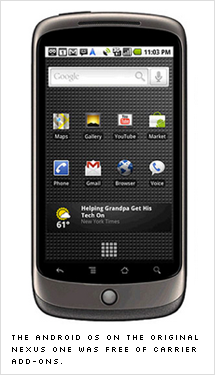 Having admitted a few months ago that I’ve come to terms with JavaScript, I have to admit that recent events have made me more sympathetic with iPhone fans. I’m a long-time Android user, and I don’t plan to change; Android has a better track record on innovation and on openness. You can debate Google’s commitment to open source, but openness is a joke when you can’t even get an app on the phone without Apple’s approval.
Having admitted a few months ago that I’ve come to terms with JavaScript, I have to admit that recent events have made me more sympathetic with iPhone fans. I’m a long-time Android user, and I don’t plan to change; Android has a better track record on innovation and on openness. You can debate Google’s commitment to open source, but openness is a joke when you can’t even get an app on the phone without Apple’s approval.
Apple’s design sense is admittedly better, but Android’s user interface is pretty good; if Apple didn’t exist to be teach us what great design was, we’d certainly be happy with Android. Way, way better than any of the feature-phones I’ve used in the past.
So what changed? I’ve been a sheltered Android user: I go to a lot of Google events, and at one point had a whole stack of Android phones sitting on my desk (most of which were tied to carriers that I don’t use). I’m also an AT&T customer, and it was a simple matter to put an AT&T SIM into an unlocked phone and get on the network. But recently, I was running across the street when my trusty Nexus fell out of my pocket and had an unfortunate rendezvous with the wheels of a passing truck. So I reluctantly bought a new Motorola Atrix from AT&T. It’s a nice piece of hardware: 1 GHz dual core processor, plenty of memory, etc. No complaints about the hardware.
But man, AT&T’s notion of Android is a lot different from Google’s. Android as Google ships is it really quite good. Not excellent, but more than good enough. AT&T has taken that basic goodness and broken it by piling on glopware, bloatware, and you-don’t-need-it-and-you-can’t-delete-it-ware. They’ve rearranged things in stupid ways, changed icons that were familiar and serviceable, and botched things up in many other ways. An AT&T logo for the browser? Why would I associate the AT&T’s death star with the web? Why list apps you’ve downloaded separately from apps that come with the phone? Why banish Google Maps from the home screen? (AT&T has its own GPS navigation app, which they charge for using.)
I could go on, but I won’t. Each change was minor, taken by itself, but they added up, and turned a good user experience into a mediocre user experience. Maybe I wouldn’t feel so strongly if I weren’t accustomed to the neater, trimmer Android that Google delivers; but suddenly, the light went on, and I said, “Oh, that’s why Apple fans hate Android so much.” I don’t know what other carriers do; does Verizon mangle Android so badly on the phones they ship? As I said at the outset, I’ve been sheltered, and the real world isn’t living up to my expectations.
The price of openness may well be letting vendors break stuff. And I suppose I’m willing to pay that price. But I don’t have to be happy about it. I hope Google can figure out how to exert some control over what vendors do with Android; that would be good for the whole community. AT&T and other carriers are not helping Android, or themselves, by turning a great product into a second-rate one. And maybe I’m becoming soft in my old age, but I now understand what Apple fans hate about Android.
Related:
